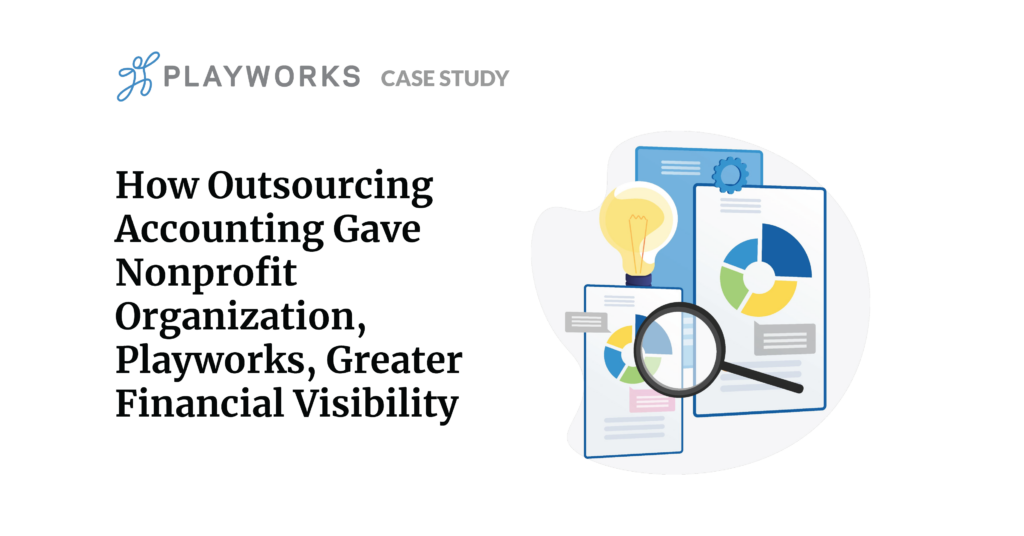Accounting for Nonprofit Organizations
Scrubbed specializes in accounting for nonprofit organizations. Navigate financial stewardship with our tailored solutions for mission-driven success.
Accounting for Nonprofit Organizations Made Simple
At Scrubbed, we understand the needs of tax-exempt organizations, and we help nonprofits set up and maintain efficient accounting processes that meet legal requirements and protect hard-earned reputations.
Expert Nonprofit Accounting Support
Depending on the stage and needs of your business, we can provide the following services:

Featured Work
Case Study
The non profit organization Playworks, which supports learning and physical health for low-income students, experienced significant financial challenges prior to partnering with Scrubbed. Playworks enlisted Scrubbed during a transition to a new accounting system, which evolved into a transformative long-term partnership.
Case Study
Your cleantech company is already focused on environmental goals through eco-friendly products or services, but your firm can also benefit from committing to environmental, social, and governance (ESG) principles across the business.
Ben Kornell
Managing Partner, Common Sense Growth

Satoshi Steimetz

Download Capabilities Brochure here:
Want to learn more about our services or meet more of the Scrubbed team?
Featured Insights
CASE STUDY
How Outsourcing Accounting Gave Nonprofit Organization Playworks, Greater Financial Visibility
Meet Our Nonprofit Accounting Experts

Laurence Ruelo
Director
Our Director of Finance, Laurence, has more than 10 years’ experience providing full accounting and advisory support to Nonprofit clients. Many of his projects have included working on-site with international organizations to streamline their finance processes across their locations and ensure accurate reports for individual locations and organization-wide.

James Bryan Torrico
Senior Manager
FAQs
Outsourcing your accounting means hiring an outside firm with specialized nonprofit expertise to manage financial tasks, compliance with regulations, and reporting. The approach lets you adjust services based on the organization's needs throughout the year, leading to improved financial oversight and operational efficiency.
Partnering with an outsourced accounting services provider gives you access to professionals who specialize in financial management for nonprofits. This covers fund accounting, grant tracking, and compliance with regulations like IRS 990. Outsourcing can also help your nonprofit with timely and accurate reporting, which is essential for building trust with donors, board members, and other stakeholders.
It can also be more cost-effective to outsource accounting tasks. Your organization avoids the costs of hiring and training full-time staff while still benefiting from the nonprofit-specific expertise. Improving budgeting, cash flow management, and strategic planning, helps you maximize the impact of all your resources.
Grant funding comes with strict reporting standards, and outsourced firms are familiar with the compliance criteria set by grantors and donors. To avoid accidentally mixing restricted and unrestricted funds, an outsourced accounting partner will set up and manage systems to track expenses against grant budgets. Outsourced experts can also help you manage indirect cost allocations and ensure financials meet the expectations of the grantor.
Outsourced accounting teams are familiar with preparing financial statements that meet U.S Generally Accepted Accounting Principles (GAAP). Cleaner records also help streamline audit preparations.
An outsourced accounting partner can help if your board members are frustrated by unclear financial reports, or your donors need reassurance that their funds are being properly stewarded. An outsourced firm will be able to provide accurate and timely financial data via clear dashboards and data visualization that make it easier to understand. Using a third party for accounting support also demonstrates that you are serious about financial integrity.
Outsourcing is frequently more cost-effective for small to mid-sized nonprofits than building your own team, because you don't need to find the full-time salaries and benefits associated with in-house staff. You can access and pay for high-level expertise only when you need it.
Experienced outsourcing firms keep up with the latest tax regulations that affect nonprofits. They help you complete IRS Form 990 and other tax documents promptly and accurately so that you mitigate the risk of IRS fines for mistakes or late submissions.
Outsourced accounting teams help your nonprofit establish robust internal controls, like segregation of duties, regular reconciliations, and thorough transaction reviews, to prevent fraud and detect any discrepancies. Your organization can reduce the danger of financial mismanagement by partnering with an outsourced team.
Nonprofits often struggle with budgeting and find it difficult to create realistic forecasts. Outsourced accountants use historical data and sophisticated financial modeling to help develop more useful budgets and forecasts. You can also call on your outsourced team to provide insights for program planning or resource allocation, which can be helpful when you're dealing with multi-year grants or variable donor revenue.
Because they work with a wide range of nonprofit clients, outsourced accounting firms usually have experience with different nonprofit accounting software platforms. They can manage and improve your existing systems or help you implement new ones tailored to your organization's needs.
Building a strong relationship with your donors is essential and outsourcing can increase transparency and visibility into how you’re stewarding funds. Clearer reports and data visualizations make it easier to communicate effectively and using an outsourced team frees up time and bandwidth for in-house employees to focus more on donor engagement activities.
An outsourced accounting team can improve your cash flow forecasting and expense management. This often helps position your nonprofit to manage grant cycles and unexpected funding gaps.
The worries that nonprofit leaders express about outsourcing include data security and confidentiality concerns, the fear that outsourcing will lead to gaps in the knowledge of the organization's history, operations, and donor relationships, and issues with communication and responsiveness.
Acknowledging these and any other concerns can help your nonprofit to screen and select the right outsourcing partner.
A few different scenarios can indicate that your organization would benefit from outsourcing your accounting:
- Increasing complexity: When you have to manage multiple funding sources or need to comply with nonprofit-specific regulations like reporting IRS Form 990, outsourcing can provide the specialized expertise you need.
- Limited internal resources: If your staff members are stretched thin and financial tasks are being handled by employees without any formal accounting training, outsourcing tasks to experienced professionals can let you get back to focusing on your core mission.
- Preparing for audits or compliance reviews: Outsourced professionals can make sure your books are clean and audit-ready clean and help you meet compliance requirements.
- Growing operations: If you're launching new programs or expanding to new regions, outsourcing gives you scalable support that can grow with your needs.
- Technology challenges: When you outgrow your legacy systems, outsourced partners can provide technology implementation and support.
Outsourced accounting provides you with specialized expertise that can improve financial oversight and operational efficiency. The level of financial clarity you gain will help you to make better informed decisions and build credibility with your board, donors and regulatory bodies. As a result, it will be easier to secure and manage grants, attract new funding, and expand your programs.
The combination of cost efficiency and strategic financial planning advice means you’ll be able to allocate resources to your mission more effectively and focus on creating a greater impact in the communities you serve.
First, look for a firm that works with nonprofits and understands fund accounting, grant management, and nonprofit-specific IRS regulations. Check for client testimonials, reviews, or references from other nonprofits they have worked with to get a sense of the level of support they offer. Lastly, make sure that the firm’s services are flexible enough to grow with your nonprofit and that the pricing structure aligns with your budget.
Want to learn more?
Let’s discuss how we can help by managing your day-to-day accounting needs, or taking on a larger financial management role, so you can continue to deliver on your mission-critical goals.


